Minneapolis Cop Make America White Again
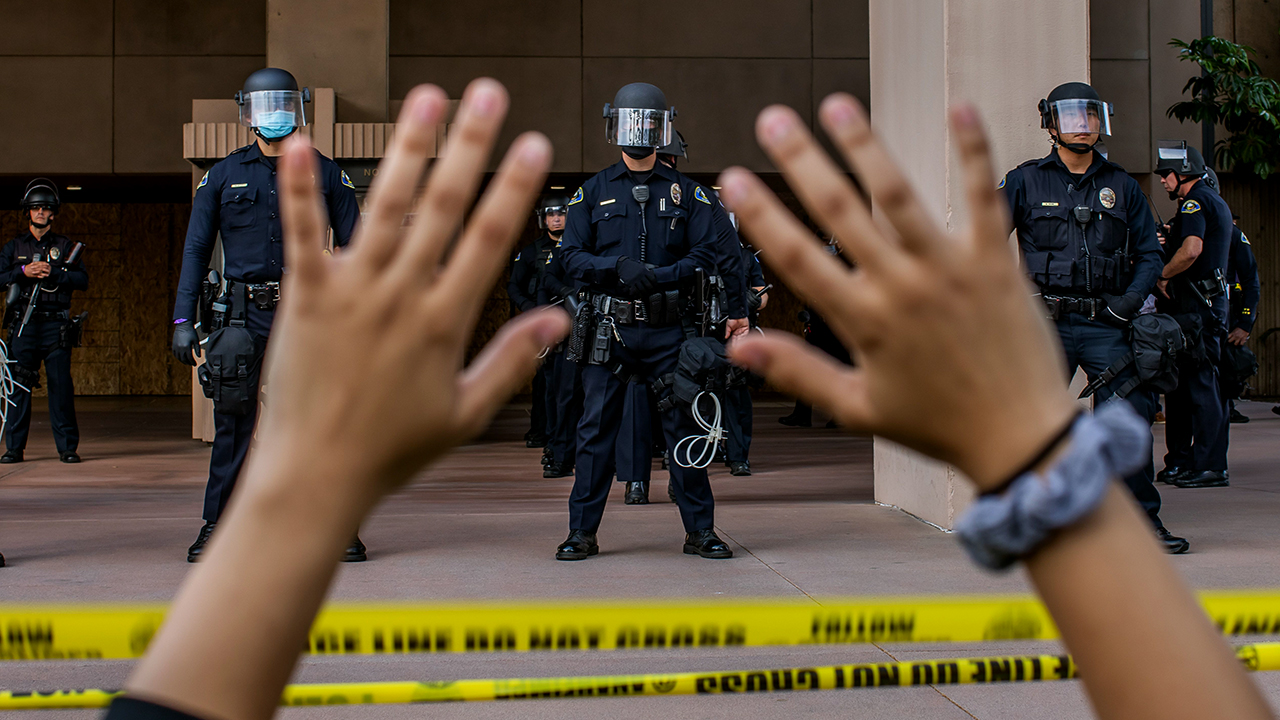
Days of protests across the United States in the wake of George Floyd's decease in the custody of Minneapolis police have brought new attention to questions most law officers' attitudes toward black Americans, protesters and others. The public'southward views of the police, in plough, are also in the spotlight. Here's a roundup of Pew Inquiry Center survey findings from the by few years about the intersection of race and law enforcement.
Most of the findings in this postal service were drawn from two previous Pew Research Center reports: one on police officers and policing issues published in January 2017, and one on the country of race relations in the U.s. published in April 2019. We also drew from a September 2016 report on how black and white Americans view police in their communities. (The questions asked for these reports, too as their responses, can be found in the reports' accompanying "topline" file or files.)
The 2017 law written report was based on 2 surveys. I was of seven,917 police enforcement officers from 54 law and sheriff's departments across the U.S., designed and weighted to correspond the population of officers who piece of work in agencies that employ at least 100 total-fourth dimension sworn police force enforcement officers with full general arrest powers, and conducted between May and August 2016. The other survey, of the general public, was conducted via the Center'southward American Trends Panel (ATP) in August and September 2016 among four,538 respondents. (The 2016 report on how blacks and whites view police in their communities too was based on that survey.) More information on methodology is available here.
The 2019 race study was based on a survey conducted in January and February 2019. A total of vi,637 people responded, out of 9,402 who were sampled, for a response rate of 71%. The respondents included 5,599 from the ATP and oversamples of 530 not-Hispanic blackness and 508 Hispanic respondents sampled from Ipsos' KnowledgePanel. More information on methodology is bachelor here.
1Majorities of both blackness and white Americans say black people are treated less fairly than whites in dealing with the police and by the criminal justice system as a whole. In a 2019 Centre survey, 84% of black adults said that, in dealing with law, blacks are by and large treated less fairly than whites; 63% of whites said the same. Similarly, 87% of blacks and 61% of whites said the U.S. criminal justice organisation treats black people less adequately.
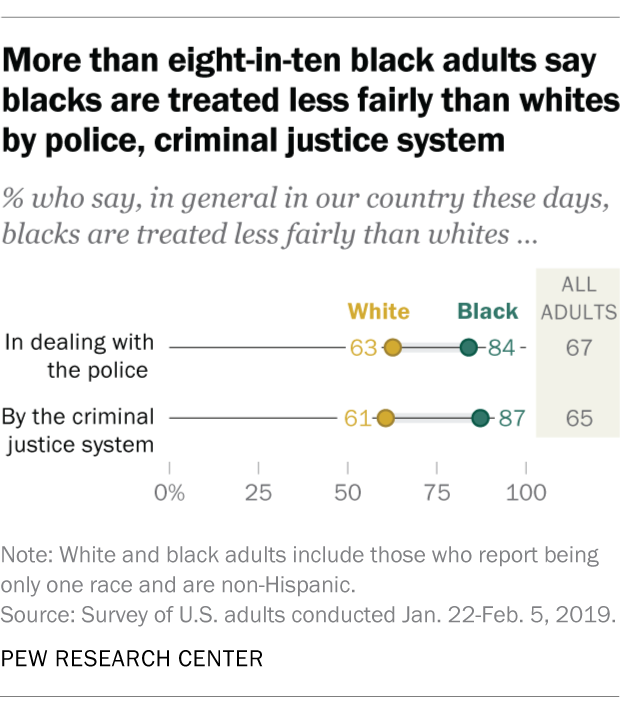
2Black adults are about five times as probable as whites to say they've been unfairly stopped past police force because of their race or ethnicity (44% vs. nine%), according to the same survey. Black men are especially probable to say this: 59% say they've been unfairly stopped, versus 31% of black women.
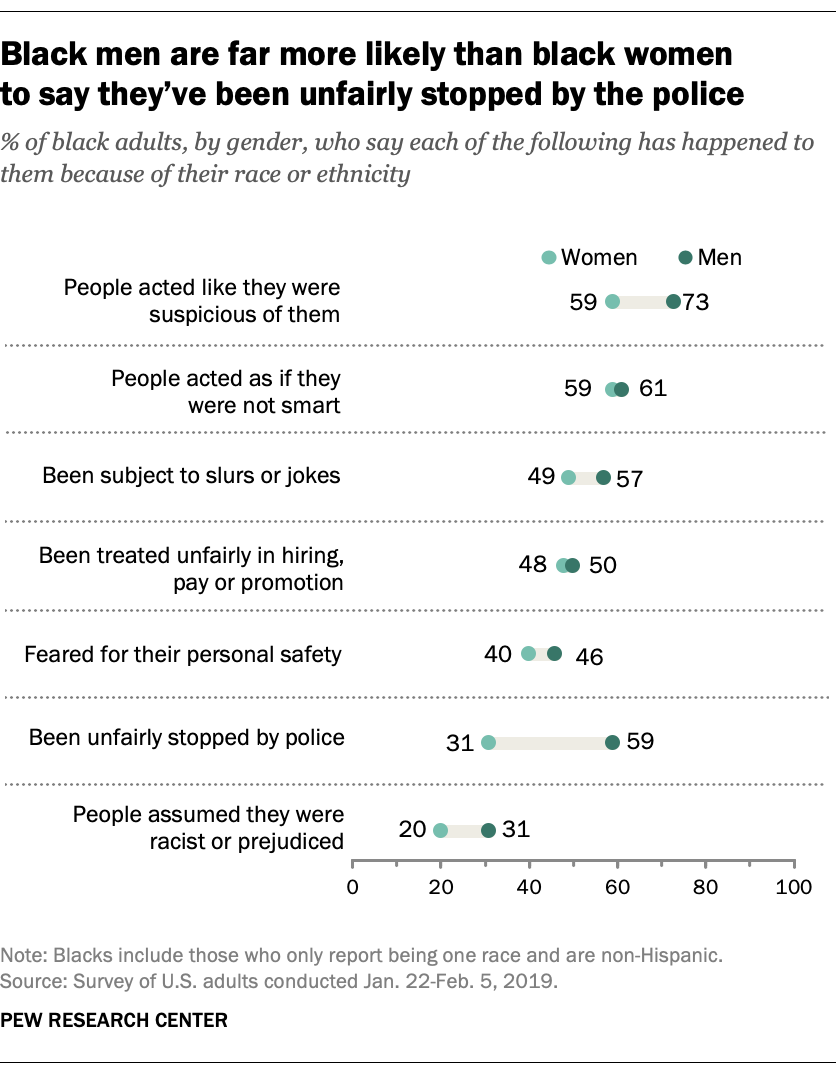
3White Democrats and white Republicans have vastly different views of how black people are treated by police and the wider justice system. Overwhelming majorities of white Democrats say black people are treated less adequately than whites past the police force (88%) and the criminal justice system (86%), according to the 2019 poll. Nearly four-in-ten white Republicans concur (43% and 39%, respectively).
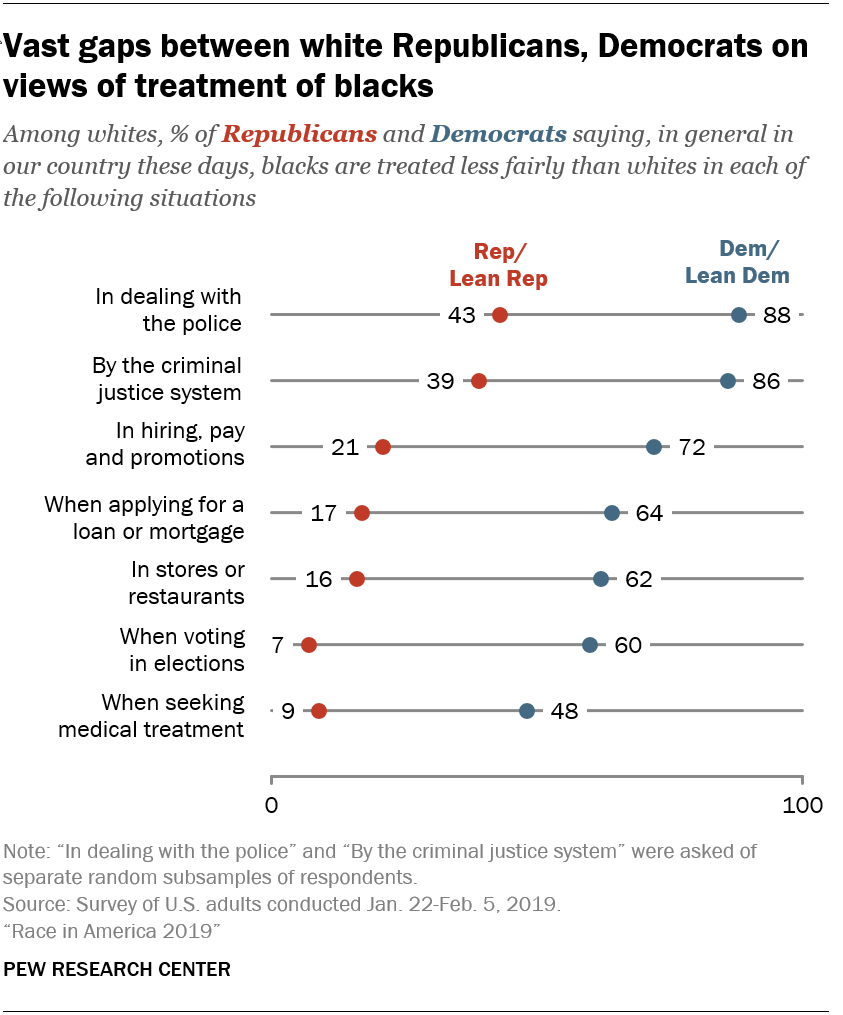 4Almost two-thirds of black adults (65%) say they've been in situations where people acted as if they were suspicious of them because of their race or ethnicity, while simply a quarter of white adults say that'south happened to them. Roughly a third of both Asian and Hispanic adults (34% and 37%, respectively) say they've been in such situations, the 2019 survey found.
4Almost two-thirds of black adults (65%) say they've been in situations where people acted as if they were suspicious of them because of their race or ethnicity, while simply a quarter of white adults say that'south happened to them. Roughly a third of both Asian and Hispanic adults (34% and 37%, respectively) say they've been in such situations, the 2019 survey found.
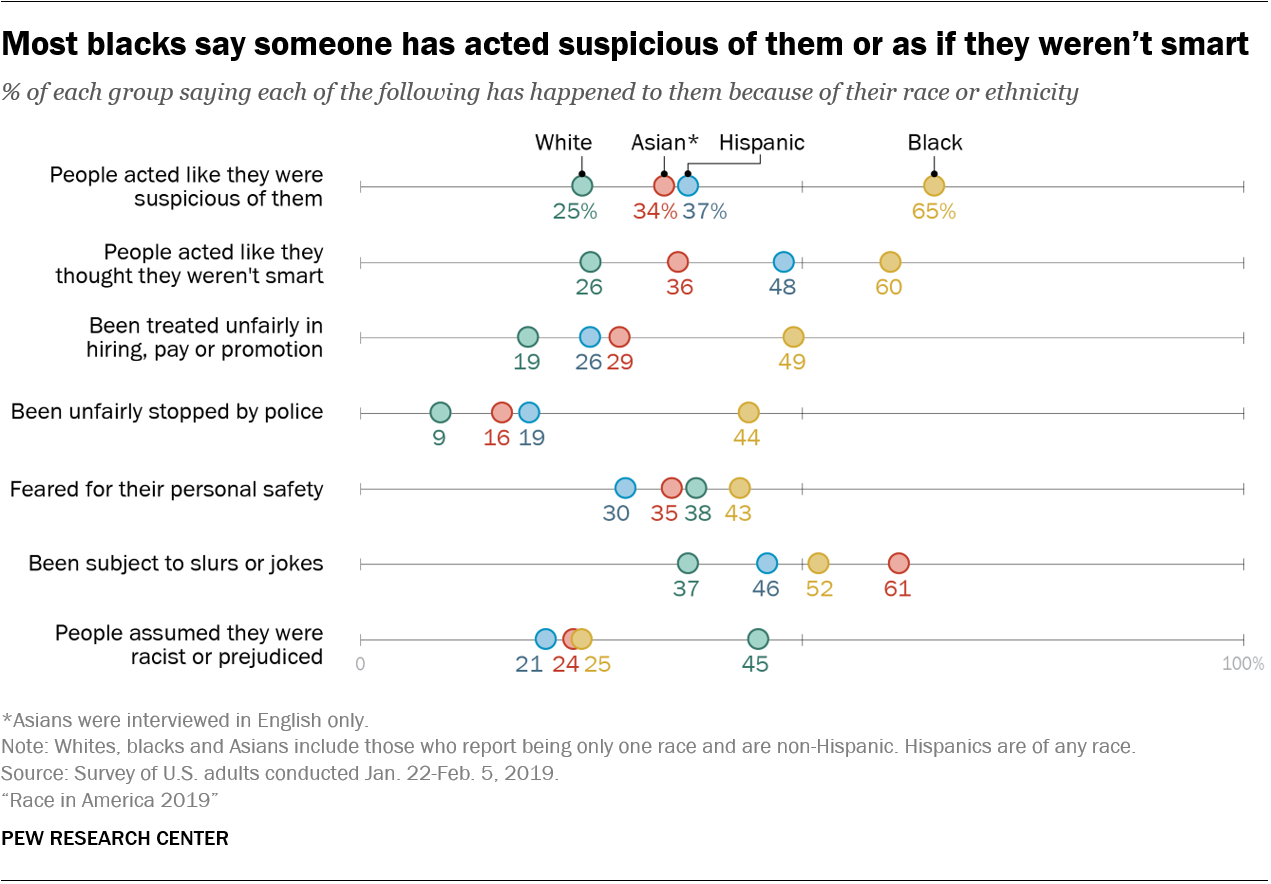
5Black Americans are far less likely than whites to give police high marks for the way they do their jobs. In a 2016 survey, only about a third of black adults said that police in their customs did an "excellent" or "skilful" job in using the right amount of force (33%, compared with 75% of whites), treating racial and indigenous groups equally (35% vs. 75%), and holding officers accountable for misconduct (31% vs. 70%).
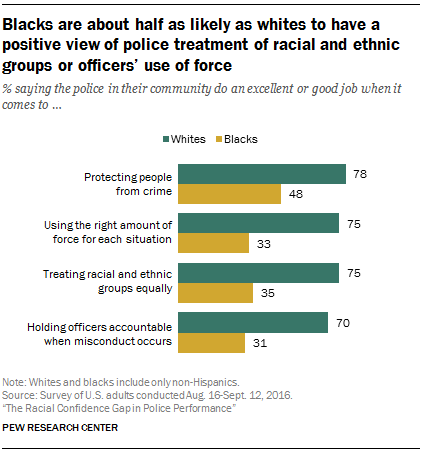
half-dozenIn the past, police officers and the general public accept tended to view fatal encounters between blackness people and police very differently. In a 2016 survey of nearly 8,000 policemen and women from departments with at least 100 officers, two-thirds said almost such encounters are isolated incidents and not signs of broader problems between police and the blackness community. In a companion survey of more than iv,500 U.S. adults, 60% of the public chosen such incidents signs of broader issues between police and blackness people. Merely the views given by police themselves were sharply differentiated past race: A majority of black officers (57%) said that such incidents were evidence of a broader problem, but only 27% of white officers and 26% of Hispanic officers said so.
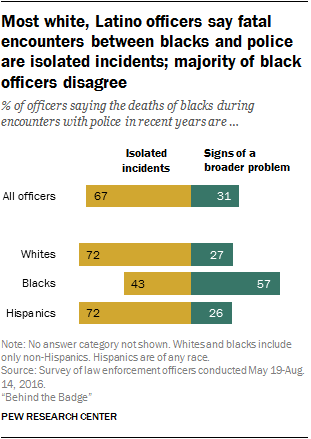
7Effectually two-thirds of police officers (68%) said in 2016 that the demonstrations over the deaths of black people during encounters with law enforcement were motivated to a great extent by anti-police bias; simply 10% said (in a separate question) that protesters were primarily motivated by a genuine desire to hold law accountable for their deportment. Hither as elsewhere, police officers' views differed past race: Merely well-nigh a quarter of white officers (27%) simply effectually half dozen-in-x of their blackness colleagues (57%) said such protests were motivated at least to some extent past a genuine desire to hold police accountable.
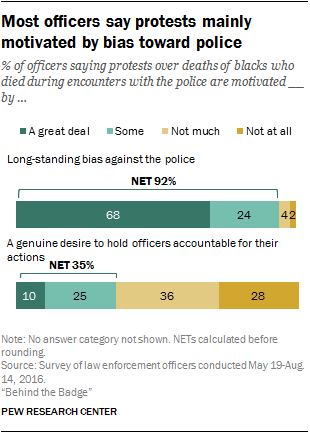
eightWhite police officers and their blackness colleagues take starkly dissimilar views on fundamental questions regarding the state of affairs of blacks in American lodge, the 2016 survey found. For example, near all white officers (92%) – just only 29% of their black colleagues – said the U.Due south. had made the changes needed to assure equal rights for blacks.
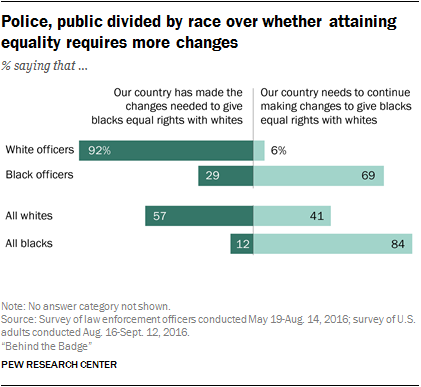
9A majority of officers said in 2016 that relations betwixt the police in their department and black people in the community they serve were "splendid" (eight%) or "practiced" (47%). Still, far higher shares saw excellent or expert community relations with whites (91%), Asians (88%) and Hispanics (70%). About a quarter of police officers (26%) said relations between police and black people in their community were "only fair," while nigh ane-in-five (18%) said they were "poor" – with black officers far more likely than others to say so. (These percentages are based on only those officers who offered a rating.)
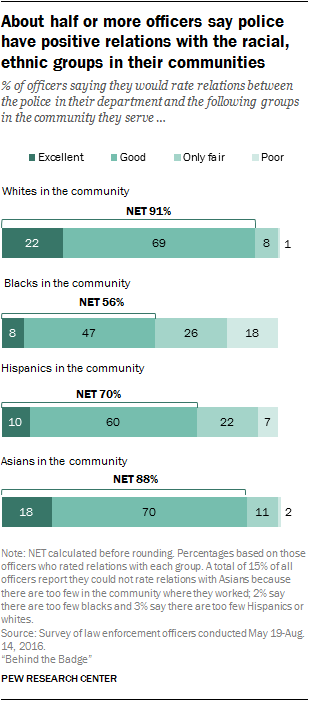
10An overwhelming majority of police officers (86%) said in 2016 that loftier-profile fatal encounters between blackness people and constabulary officers had made their jobs harder. Sizable majorities also said such incidents had made their colleagues more worried about safety (93%), heightened tensions betwixt police and blacks (75%), and left many officers reluctant to utilise force when advisable (76%) or to question people who seemed suspicious (72%).


Michael Lipka is an editorial manager of religion research at Pew Research Center.

Dalia Fahmy is a senior author/editor focusing on faith at Pew Research Center.
Source: https://www.pewresearch.org/fact-tank/2020/06/03/10-things-we-know-about-race-and-policing-in-the-u-s/
0 Response to "Minneapolis Cop Make America White Again"
Post a Comment